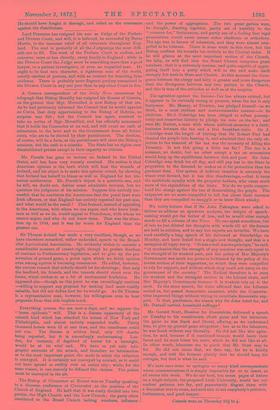The agitation against the Income-Tax has always existed, but it
appears to be curiously strong at present, when the tax is only fourpence. Mr. Massey, at Tiverton, has pledged himself—as we think, in a most reckless and unstatesmanlike manner—to its abolition. Sir J. Coleridge has been obliged to refuse peremp- torily and somewhat bitterly to pledge his vote on the tax ; and even Mr. Baxter, a man with whom political economy is a faith, hesitates between the tax and a free breakfast-table. Sir J. Coleridge went the length of hinting that Sir Robert Peel had cheated the people into bearing it, and admitted that the only ob- jection to the removal of the tax was the necessity of filling the Treasury. Is not this going a little too far? The tax is a nuisance, no doubt, but no other except a tax on successions would keep up the equilibrium between rich and poor. Sir John Coleridge may drink tea all day, and still pay less to the State in proportion to the demand he makes on it for protection than his gardener does. Our system of indirect taxation is certainly the wisest ever devised, but it has this disadvantage,—that it taxes the multitude equally with the property-holders, who cause much more of the expenditure of the State. Nor do we quite compre- hend the charge against the tax of demoralising the people. The taxpayers are no more compelled to tell lies about their incomes than they are compelled to smuggle or to brew illicit whisky.


































 Previous page
Previous page